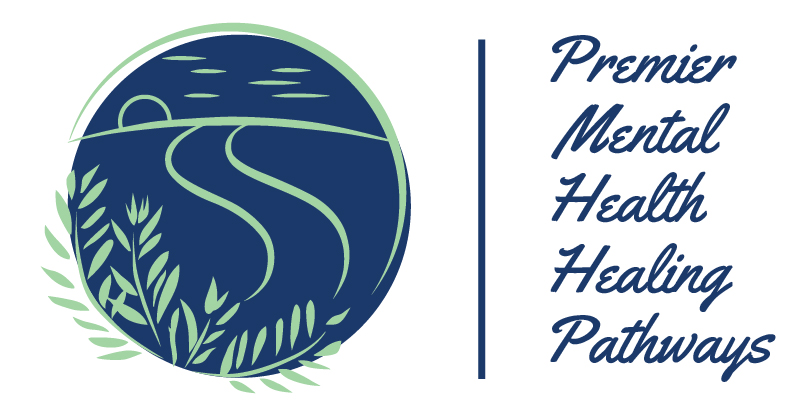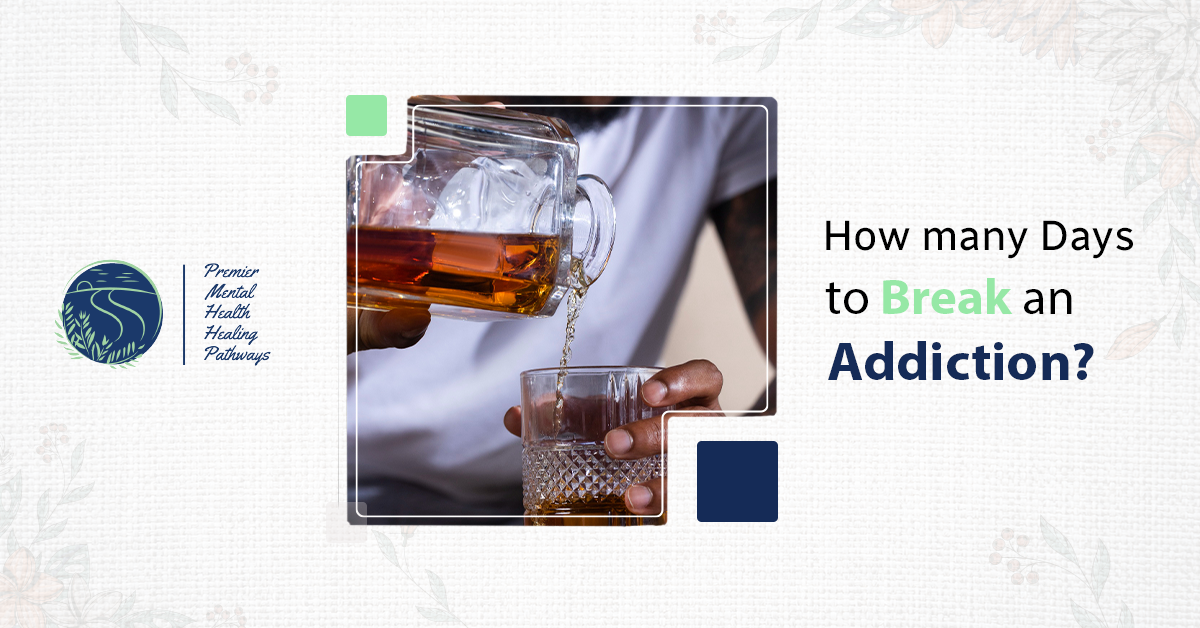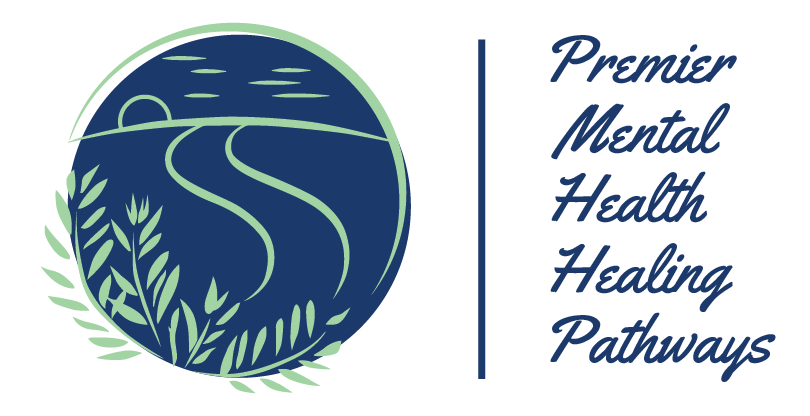Addiction is more than a habit. It’s a chronic disease. Unlike nail-biting, it often leads to relapse. Overcoming it requires more than willpower or time. Recovery is complex, with no quick fixes or strict timelines. It needs understanding, patience, and often professional help.
Chemical changes occur in the brain with dependency. Addiction, a strong habit, traps its victims. However, breaking addictions is possible. It comes step by step, breaking these powerful bonds.
Let’s find out how many days to break an addiction.
Are you or a loved one seeking information on addiction treatment? Consider Premier Mental Health Healing Pathways. They can assist in your healing journey.
What Defines Addiction?
Addiction tightly grips its victims. This chronic condition forces compulsive behavior or substance use, ignoring outcomes. Victims feel trapped, unable to escape despite their desire to. Their actions, driven by addiction, defy reason and will, damaging their lives.
Yet, understanding addiction is vital before discussing its progression. It’s complex, involving both physical and psychological aspects. It distorts desires and takes away control. Addictions fall into two main categories:
- Substance Addiction: This includes drugs, alcohol, nicotine, and even caffeine.
- Behavioral Addiction: This includes gambling, food, shopping, technology, or even exercise.
Addiction alters brain chemistry, making behaviors hard to change and stopping difficult. Over time, habits become more addictive. The length of addiction influences recovery. It can either extend or shorten the path to freedom.
Factors That Influence the Time to Break Addictions
Type of Addiction
- Substance Addiction: Physical dependency can make drug or alcohol addiction harder to break. Quitting nicotine may take weeks to break the habit. But cravings can last for months or even years.
- Behavioral Addiction: Addictions like gambling or tech overuse lack physical withdrawal. But the psychological grip can be just as firm.
Addiction Timeline
Addiction becomes more challenging to break with time. A 20-year-old smoker has a more formidable challenge than a six-month one. Years build habits, making them more difficult to break. Long-term dependencies are deeply rooted and resist change. Yet, there is hope. With effort, you can beat even old addictions. The path may be longer, but freedom is there for those who keep going.
Severity of the Addiction
The addiction’s severity will affect the addiction recovery timeline. It depends on how often and intensely the behavior is engaged in. Daily heavy drug users will take longer to recover than those with milder or occasional use. Their recovery will be more complex, too.
Physical and Mental Health
Mental health issues, like depression and anxiety, can hinder addiction recovery. They can make it longer and harder. Trauma can do the same. Poor health can impair recovery, especially in substance abuse cases. In those, the addiction has damaged the body.
How to break addiction cycle?
Support Systems
A strong support network can help reduce the time to overcome an addiction. This network can be family, friends, or professionals like therapists or addiction specialists. Recovery is significantly more challenging for those who try to go it alone.
Treatment Programs
Engaging in a formal treatment program will affect how long it takes to break an addiction. This includes detox, therapy, or a rehab center. Structured programs aim to speed up recovery. They work better than trying to quit alone.
How Long Does It Take to Break Specific Addictions?
-
Nicotine Addiction
Nicotine is tough to quit. Its physical effects fade in days. Yet, psychological dependence can last weeks or months. Smokers and vapers face a tough challenge. Withdrawal symptoms peak around day five. Overcoming this requires effort, often taking three months. Cravings test willpower but come and go. With time and determination, freedom from nicotine is achievable.
-
Alcohol Addiction
Quitting alcohol is challenging. Withdrawal can be risky. Detox lasts days to weeks. It depends on the level of addiction. Recovery takes patience, often months to a year. Long-term drinking damages the body and mind. Healing needs time to restore balance and health.
-
Drug Addiction
Addicts face intense withdrawal when seeking freedom. Physical and mental pain can last days or weeks. Heroin and meth users might suffer for up to 10 days. However, true healing needs months of sobriety and counseling. It’s a long journey, but recovery is possible for those who seek it.
-
Food Addiction
Food addiction often stems from emotional issues, not just physical cravings. Unlike drug addiction, stopping overeating doesn’t cause withdrawal symptoms. It takes time and patience to overcome this habit. The severity of the addiction affects the addiction recovery timeline, ranging from over a month to more. To eat better, one needs to be persistent and thoughtful. Changing habits and addressing deeper problems takes time.
-
Technology Addiction (e.g., Gaming or Social Media)
Experts say that digital detoxes of 30 to 90 days can reset the brain and improve habits. Overcoming screen or gaming addictions is tough. Recovery progress is often unclear. Thus, a long break is vital for better tech use.
How Many Days to Break an Addiction?
Studies suggest it takes 90 days for the brain to rewire itself and overcome addiction’s compulsive behaviors. This 90-day period helps to:
- Reset the Brain’s Reward System: Addictive substances and behaviors hijack it. They release dopamine, which creates a craving for more. After 90 days, the brain’s dopamine levels begin to normalize.
- Develop New Habits: It takes 60 to 90 days to form a habit. At that time, old, addictive behaviors were replaced with healthier ones.
- Heal Health: For most, this time lets the body heal from the addiction. It also helps the mind stabilize.
Effective Strategies for Breaking Addictions
Seek Professional Help
Professional support is often essential for breaking an addiction. This can be through counseling, therapy, or rehab. Therapists can help you find the causes of your addiction. They can also offer coping strategies.
Build a Support Network
Surround yourself with positive influences. Support from friends, family, and recovery groups can speed up recovery. Groups like Alcoholics Anonymous and Narcotics Anonymous are examples.
Create New Routines
Replace addictive behaviors with healthy activities. Try exercise, hobbies, or meditation. They can retrain your brain and reduce relapse urges.
Mindfulness
Techniques like meditation and deep breathing can help. They can manage cravings, stress, and triggers that often lead to relapse.
Set Small, Achievable Goals
Recovery is a process, so set realistic milestones. For example, aim for one day or one week of sobriety at a time rather than focusing on the long term.
Conclusion
The question, “How many days to break an addiction?” doesn’t have a simple answer.
Breaking addiction doesn’t follow a set schedule. Many notice improvement in 3 to 12 weeks, but full recovery may take longer. Everyone’s journey is unique and influenced by the person and the substance.
True healing includes mind, body, and spirit, not just stopping use. With support and dedication, you can kick the addiction for good. The journey might be extended, but lasting change is possible. So, be patient and stay focused. Your freedom is ahead.
FAQs
Can you break an addiction in 21 days?
Breaking habits takes time. Small changes might happen in three weeks. However, deeper addictions need more patience. These can take two to three months to recover. The process is different for everyone, but sticking to it is key.
How long do withdrawal symptoms last?
Withdrawal symptoms differ in length. Nicotine peaks in days, but alcohol and drugs last longer. Generally, the timeline spans days to weeks, depending on the substance or behavior. Each addiction poses unique challenges in recovery.
Can I break an addiction on my own?
Overcoming addiction requires determination. Mild cases might be managed alone. However, severe ones need expert help. Professional support is crucial for lasting health. It significantly boosts recovery chances.
How long does it take to break addiction?
Addiction’s hold weakens in about 90 days. This time, let the brain reset. It fosters new, healthy habits and replaces harmful ones. As brain pathways adjust, better habits form, leading to lasting change.





No comment